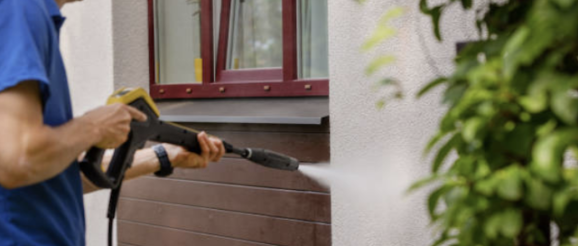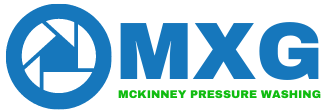How Often Should You Pressure Wash Your Home?

Pressure washing is a quick option if your home starts looking drab and outdated. Within just a couple of hours, your home can be restored to its beautiful appearance with nothing more than high pressure water.
You can rent pressure washing equipment from many home improvement stores, or you can hire a McKinney pressure washing service. It could be a little more expensive upfront, but you don’t have to deal with bringing back equipment or run the risk of damaging your home due to lack of training or experience.
However, pressure washing can damage your home just as fast as it can clean it. The pressurized water can break windows, damage siding and ruin roof shingles. Therefore, you need to be careful how often you pressure wash your home and who you let do it.
Is it Time to Pressure Wash Your Home?
The question of how often to pressure wash your home is one that depends heavily on where your home is located and environmental factors based on that location.
Most pros will encourage having your home pressure washed once a year or, at least every 2 years.
Any pressure washing company that tells you that more frequent services are needed is just trying to squeeze a little more money out of you. However, it’s your home, and if you love the way it looks shortly after a cleaning, you can pressure wash your home several times a year.
By just touching the wood or siding of your home, you will be able to tell if it needs a cleaning. The presence of dirt, mud and grime can stain the outside of your home permanently if it isn’t washed off from time to time, so you might have to deviate from a planned schedule if you notice too much buildup between cleanings.
Power washing often can be detrimental, but not doing it often enough will leave your home looking dirtier far more than it should. It’s necessary to note that building materials, especially vinyl siding, are very resistant to stains, mold and mildew. These materials protect your home between pressure washings.
Why Pressure Washing is the Preferred Method
Pressure washing is a lot safer than scrubbing the exterior of your home because you do not have to climb a ladder with a brush and a bucket while dragging a garden hose. Power washing can be done from the ground in most residential situations.
Mold and mildew are organic organisms that eat away at home exterior surfaces and make their way into your home. They are not very easy to get rid of, yet it is really easy for these organisms to grow into colonies on your house, especially on the north side of a home where it usually doesn’t get much sunlight or wind as other sides of your home.
Plus, pressure washing gets rid of more dirt and grime than manual hand washing.
Factors that Affect Your Home’s Exterior
All of the below items can impact the appearance of a home. They are all factors that must be considered before you decide to hire a professional pressure washer or try to do the job yourself.
CLIMATE
Factors like humidity and weather create a perfect environment for mold and mildew to grow. If you live in an area that is rainy, you might also have wind and a lot of rain splashing mud on the exterior of your home.
ENVIRONMENT
Pollen, pollution and mold can be more of a problem in some areas of McKinney than in others. Having a home in a rural area or next to an unpaved road will factor into what types of environmental factors impact your home more.
HOME CONDITION
If you think it is time to have your home pressure washed, it might be a smart idea to have chipped siding repaired so the high pressure water won’t do any more damage. Power washing can also worsen a peeling paint problem.
EXTERIOR FINISH
The equipment used for pressure washing are specific to your home’s exterior (brick, siding or paint) and the area of the home. For example, for roof cleaning, a pressure washing company will use soft washing opposed to pressure washing to protect the roof shingles. And, the expected results can vary widely.
When to Pressure Wash Your Home
Determining the correct time to have your home pressure washed is as important as determining how often the service has to be completed. There are times during the year when pressure washing would be an ultimate waste of time and money. Other times, however, a professional pressure washing service could benefit you in more ways than just appearance.
WEATHER
Don’t waste your money on pressure washing during a rainy time of year. You’ll just end up with mud stains and mildew by the end of the season regardless. Winter, as an example, isn’t the best time of year. Pressure washing is most impactful at the end of a season, whether it’s spring, summer, fall or winter.
BEFORE/AFTER HOME PROJECTS
Don’t plan to have your home pressure washed the same time you are having other projects done on your home. Rock, brick or siding might not be fastened into place during a renovation or repair like it should normally be, so you run the risk of damaging the area, prolonging the ongoing work and trapping water below building materials.
BEFORE SELLING
Pressure washing is a helpful way to increase your home’s curb appeal. It’s the easiest solution for all your home’s exterior surfaces, including sidewalks, porches, driveways, patio furniture and wood and composite decks.
SUNNY DAYS
Choose a bright, sunny day, but not one that is extremely hot. This is the optimal condition for the exterior surfaces to dry fast without baking cleaning chemicals onto your home’s surfaces.
If you live in a neighborhood with an HOA, there might be guidelines about how regularly you have your home pressure washed or if you can do it yourself or if you have to hire a local company. You might only be under HOA guidelines concerning how your home looks, but it’s ultimately up to you to have it looking maintained.
Power washing is one of the easiest and most effective methods to clean your entire home. As long as it’s done the right way, it is safe for a multitude of home surfaces and can eliminate months of built up dirt and stains.
